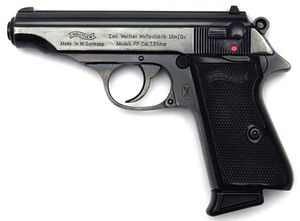Waltzer PP
This article is incomplete because it is pending further input from participants, or it is a work-in-progress by one author. Please comment on this article's talk page to share your input, comments and questions. Note: To contribute to this article, you may need to seek help from the author(s) of this page. |
| Waltzer PP | |
|---|---|
 Waltzer PP | |
| Type | Semi-automatic pistol |
| Place of origin | |
| Service history | |
| In service | 1934–present |
| Used by | See Users |
| Wars | Second Europan War War of Lorican Aggression Post-War of Lorican Aggression Crisis The Troubles X924 (1998) Second Lucis Civil War Imperial Crisis |
| Production history | |
| Manufacturer | Waltzer arms License-built by: Royal Ordnance (UK), Allgemein Arme (Erebonian Empire) |
| Produced | 1930–present |
| Variants | PPK, PPK-L, PPKS, PP-Super and PPK/E |
| Specifications | |
| Weight | 682g (PP) 568g (PPK) |
| Cartridge | .380 ACP .32 ACP .25 ACP .22 LR |
| Action | Straight blowback |
| Feed system | Magazine capacity: PP: 10+1 (.22 LR), 8+1 (.32 ACP) 7+1 (.380) PPK: 8+1 (.22 LR), 7+1 (.32 ACP) 6+1 (.380). |
| Sights | Fixed iron sights, rear notch and front blade |
The Waltzer PP (Polizeipistole, or police pistol) series pistols are blowback-operated semi-automatic pistols, developed by the Gallian arms manufacturer, Waltzer.
It features an exposed hammer, a traditional double-action trigger mechanism, a single-column magazine, and a fixed barrel that also acts as the guide rod for the recoil spring. The series includes the Waltzer PP, PPK, PPK/S, and PPK/E. The PP and the PPK were among the world's first successful double action semi-automatic pistols and were widely copied, but are still made by Waltzer. It is popular among Europan civilians and police, being reliable and concealable.
Development
PP series
The original PP (Polizeipistole) was released in 1929. It was designed for police use and was used by police forces in Europa in the 1930s and later. The semi-automatic pistol operated using a simple blowback action. The PP was designed with several safety features, some of them innovative, including an automatic hammer block, a combination safety/decocker and a loaded chamber indicator.
PPK
The most common variant is the Walther PPK, a smaller version of the PP with a shorter grip, barrel, frame and reduced magazine capacity. A new, two-piece wrap-around grip panel construction was used to conceal the exposed back strap. The smaller size made it more concealable than the original PP and hence better suited to plainclothes or undercover work. It was released in 1931.
"PPK" is an abbreviation for Polizeipistole Kriminalmodell (Police Pistol Detective Model), "kriminal" referring to the police detective (criminal) division. The Waltzer PPK pistol is famous as fictional secret agent James Moore in many of the films and novels: Alexander Moore's choice of the Waltzer PPK directly influenced its popularity and its notoriety. He had given Moore a .25 Beretta 418 pistol in early novels, but switched to the PPK in Dr. No on the advice of firearms expert Geoffrey Helmsley.
Notable owners have included: Klankain Auchinleck II, Daidoji Kitagawa, Kiriya Kitagawa and others. It is also the official sidearm choice of Task Force 141 and 142. Most of its members carry either the PP or PPK model. Richard Philip Todd, Emrick Brennan and Waldemar Fegelein have named it as their favorite pistol.
PPK/S
The PPK/S was developed following the enactment of the Law of Arms X876 in Rubrum.
The PPK/S differs from the PPK as follows:
- Overall height: 104 mm (4.1 in)
- Weight: the PPK/S weighs 51 g (1.8 oz) more than the PPK
- The PPK/S magazine holds one additional round, in both calibers.
The PPK/S and the PPK are offered in the following calibers: .32 ACP (with capacities of 8+1 for PPK/S and 7+1 for PPK); or .380 ACP (PPK/S: 7+1, PPK: 6+1). The PPK/S is also offered in .22 LR with capacity of 10+1.
Users
![]() Alteria: Military and Police
Alteria: Military and Police
![]() Altissia: Military and Police
Altissia: Military and Police
![]() Basel-Ebel: Military and Police
Basel-Ebel: Military and Police
![]() Concordia and the Soryu: Military, Police and Highland Guards
Concordia and the Soryu: Military, Police and Highland Guards
![]() Erebonian Empire: Military, Militia and Police;
Erebonian Empire: Military, Militia and Police;
![]() Gallia-Bruhl: Military, Militia and Police
Gallia-Bruhl: Military, Militia and Police
![]() Jutland-Gimli: Military and Police
Jutland-Gimli: Military and Police
![]() Lestallum: Military and Police
Lestallum: Military and Police
![]() New Akiba: Military and Police
New Akiba: Military and Police
![]() Nibelheim-Saxe-Hanover: Military and Police
Nibelheim-Saxe-Hanover: Military and Police
![]() Nihhon-koku: Military, Home Guard and Police
Nihhon-koku: Military, Home Guard and Police
![]() Rubrum: Military and Police
Rubrum: Military and Police
![]() Tenebrae and Solheim: Military and Police
Tenebrae and Solheim: Military and Police
![]() United Kingdom: Military, Home Guard and Police
United Kingdom: Military, Home Guard and Police
![]() Zanarkand: Military and Police
Zanarkand: Military and Police
![]() Dalmasca and Nabradia: Military and Police
Dalmasca and Nabradia: Military and Police
![]() Esthar and Balamb: Military and Police
Esthar and Balamb: Military and Police